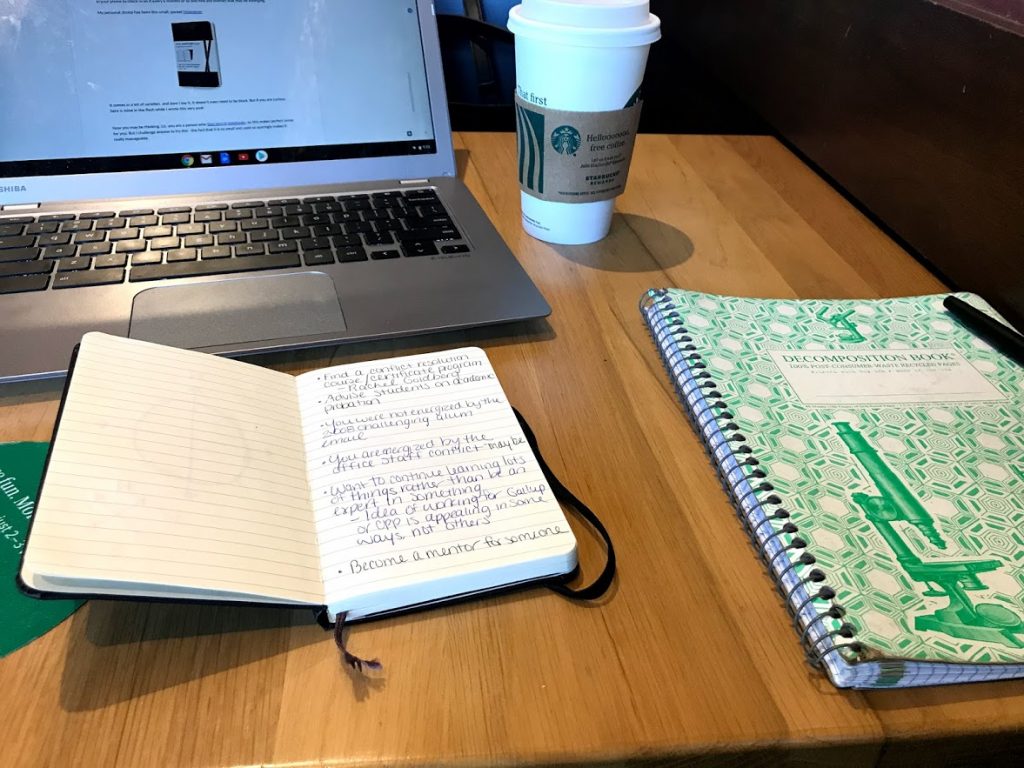The Art and Science of The Little Black Book
“The most exciting phrase to hear in science, the one that heralds the most discoveries, is not ‘Eureka!’, but ‘that’s funny…’” – Isaac Asimov
This is one of my favorite quotes of all time; I have shared it often with college students who are exploring majors and careers, all while getting ready to embark on making some big decisions.
It can be tempting to want to find one’s true calling – after all, it can be appealing to be like someone with a laser focus in life such as an Oprah or Gandhi or Bono…basically anyone important enough to have just one word in their name.
Surely they must have discovered something meaningful early on that led them confidently down a clear path for the rest of their lives. But as the quote suggests, oftentimes big discoveries are not a result of some epic epiphany, but rather by painstakingly putting together pieces to slowly form a complex puzzle. In other words:
A true, life-changing discovery can happen when we were expecting a result we didn’t get, or when we find patterns among much smaller discoveries over a significant period of time.
This leads me to – drum roll please – the little black book.
Quick side note for my younger readers: Before cell phones, people would write down phone numbers for literally everyone they knew in an address book. And for those who were living the single life, they often referred to their book of people they have dated as their “little black book”. So the title of this post is a play on words. It’s funny. Kinda. Anyway…moving on.
The Art of the Little Black Book
Early on in my career someone gave me the idea to carry a small notebook with me at work and to write down the things I like and don’t like, times when I was challenged, times when I was energized at work, and times when I felt drained. Then, over time, I would be able to look back and find some major themes; these themes would prove to be crucial as I moved forward in my career.
Here are some examples of themes I have pulled from my Little Black Book:
- I prefer helping people go from “good to great” rather than diving into long-term challenges; this eventually helped me rule out Masters in Counseling programs and instead go for a Masters in Higher Education.
- I really value transparency from my leadership; when I moved into a leadership role, I wrote a leadership philosophy and shared it with my team – transparency was the first value I listed.
- I enjoy influencing teams, but discovered that it’s easier for me (and more enjoyable) to do so when I am not the leader of that team; as a result, my next career steps are focused on ways I can impact individuals and teams without necessarily “moving up the ladder” to a Director role.
The Science of the Little Black Book
It needs to be small enough to carry with you wherever you go so that you can jot something down in it any time, but be substantial enough to last for a while (I have used the same one for six years now). I also encourage you to set reminders in your phone to check in on it every 6 months or so and find any themes that may be emerging.
My personal choice has been this small, pocket Moleskine:
It comes in a lot of varieties, and dare I say it, it doesn’t even need to be black. But if you are curious, here is mine in the flesh while I wrote this very post, open to the first page:

Now you may be thinking, Liz, you are a person who likes lots of notebooks, so this makes perfect sense for you. But I challenge anyone to try this – the fact that it is so small and used so sparingly makes it very manageable.
Try it out and before you know it, you will be on your way to making some MAJOR discoveries…little by little.
And on that note, I leave you with this thought experiment:
What crucial themes might you discover if you were able to look back over time?